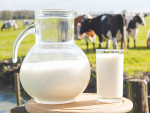Last week Canterbury processor Synlait dropped its forecast payout for the season by 50c to $6.25/kgMS.
ASB’s senior analyst Nathan Penny says the bank is sticking to its forecast of $6/kgMS despite other banks raising their forecast payouts.
Penny says after a strong December result he continues to expect 5% growth this season.
“So far, 2018-19 dairy production has been very strong. In the December month, production was 6.1% higher than 12 months ago,” he says.
For the season to date, production is running 5.2% ahead of the 2017-18 season.
Penny thinks there’s more to come.
“Relatively healthy soil moisture levels suggest that production should kick on over the next few months. With that in mind, the risk of drought derailing production later in the season continues to recede. On this basis, we can reconfirm our 2018-19 season production growth forecast of 5%. Indeed and as we have stated previously, this season is comfortably on track to set a new record.
“We are more bullish than many other forecasters who are generally forecasting nationwide production growth in the 3% to 4% range. However, our more bullish production forecast translates into a more careful milk price view.”
The two Global Dairy Trade (GDT) auctions this year have seen lifts in dairy prices.
But Synlait chief executive Leon Clement says until recently commodity prices had been declining for some time.
“This is in part due to global demand reacting to very strong production from New Zealand carrying into summer, alongside expectations of better production growth in the northern hemisphere.”
Clement says its new forecast of $6.25/kgMS depends on commodity prices continuing to recover for the rest of the season but this is considered realistic in light of supportive global demand fundamentals.
“Our milk suppliers will not be surprised by this change as we communicate openly with them about the fluctuations in global pricing on a regular basis,” says Clement.
Fonterra’s current farmgate forecast is $6-$6.30/kgMS.
No other banks are revising upwards at this stage but say at least they won’t be going down.
Rabobank is forecasting $6.25/kgMS for the 2018-19 season and says the last GDT result underpins that.
ANZ says while it has yet to revise the result, at least it removes the downside risk to its $6.10/kgMS forecast.
BNZ says a milk price over $6/kgMS for 2018-19 is now more likely.
Westpac’s Anne Boniface says GDT dairy prices have now risen 7% over the last month and are up 11% from their November lows.
The last GDT result was led by a 10.3% jump in skim milk powder (SMP) prices, while whole milk powder (WMP) prices were also up a solid 3% to US$2777/t, Boniface says.
The recent lift in SMP prices is particularly notable given the 14.5% increase in the volume of SMP sold in the most recent auction. Usually the volume of SMP sold gradually falls at this time of year.
ANZ’s Susan Kilsby says the latest auction and the upward run in prices over the last three months have removed most downside risks to their $6.10/kgMS forecast.
“I am quite confident now that we will see a milk price over $6/kgMS this season but we haven’t done an official revision yet,” she says.



















